Introduction
The company is based on the growth experienced in the bakery industry. This growth of the industry in the United Kingdom is a clear indication that the market for bakery products is on an ever-growing trend. Loly bakery is a home-based business. The aim of the firm is to serve the end consumers of the bakery products through offering products which are as close as possible to homemade ones. With this framing, the firm expects to have more direct contact with the customers through the visit to the locality for the purchase of the products. This direct contact with the customers is aimed by the business to avail the products at the convenience of the customers as well as satiate the objective of offering quality products at the economic level of consumers.
Target market
The target market for Loly Bakery is loyal and thus regular customers for the bakery products in this locality. These loyal customers include those who have been purchasing these products on a daily basis, weekly basis or monthly basis. They are those who almost are certain of using bakery products whenever an occasion comes up. Specifically, these are people who are seen daily flocking to supermarkets in the locality to buy the bakery products. They are those who use these products for their daily meals, as snacks, and those who buy them as presents.
The customer base for Loly Bakery is not broad and undefined. Instead, it is specifically referred to people in this town who have been complaining that they are not getting quality for their money. The firm is built on the realization that in this town, there are many individuals who are daily, weekly and monthly buying cakes, doughnuts, and other bakery products for consumption individually or for parties but who are not satisfied with the products they are getting at their locality. For these, Loly bakery is the solution, and they are the specific market for the bakery.
Location
Loly bakery is to be situated in the core of Little India. This location was chosen for two reasons. First is its central location from all sides of the town. This location means that people from each side of the town can easily access the venue and buy the products because it is close to all of them. The location at this place is also convenient to the customers due to the easy accessibility by roads.
Business objectives (short, medium and long term)
The short-term objectives of the company are three-fold. On the economic side, the business aims at providing affordable products to the increasing demand. The business identifies that the middle class is the population inhabiting this locality. For such, the business identifies that having to buy these products from the supermarket has always been a big tall. Considering that the prices of these products are very high in the supermarkets in this town, this business comes out with the aim of helping the people get the economic burden lifted through providing them with the products at a discounted price. It aims at availing the same cakes desired by these people at a price which is considerate to their incomes and thus which does not strain them economically.
On the second objective, Loly Bakery is based on the principle of providing cakes which are of high quality. This comes from the complaints which have been received from the market research done. Reviews of these complaints identified that customers were not satisfied with the quality of the products they got from the supermarkets. They, for example, complained that some of the cakes had overstayed. Others complained that the preservation for the same had not been effectively done by the supermarket.
Overall, the market research revealed that the majority of customers of the bakery products were yearning for a chance to get products which were more close to homemade ones. The aim of Loly bakery is to satiate the wish of these customers for homemade cakes through making fresh cakes. Loly is intended to bring the experience of homemaking to the satisfaction of the customers. Loly Bakery also aims at ensuring quality is reached through clear and effective preservation techniques as well as clear inventory replacement strategies which will ensure that cakes do not stay for more than two days after their manufacture.
In the long-term, the business aims to expand both the market and the economic objectives. As an example, in the second year of operation, the business intends to have four more branches in the town. In the third year, the business intends to have a presence in more than four towns. This growth is expected to continue and enable the business to have a national presence in its fifth year of operation.
The other long term objective for the company is to reduce the prices of the bakery products for the consumers to reach the levels where they do not feel the economic pinch from buying them. This objective is to be reached by the firm through strategies aimed at efficient use of resources to ensure the costs of production are minimized. These minimized costs of production are to be passed down to customers in the form of reduced prices for the cakes they will be acquiring. The benefits are to come in phases which will also be representative of the increasingly effective costs management strategies by the firm.
Type of business structure
Loly is a home-based bakery company which will be started by the entrepreneur as a sole proprietor. The business will be run by the entrepreneur as the manager who will also keep records and balance books. The intention is to operate on this structure until when the business is ready for expansion and thus requires more financing and management considerations.
Manpower requirements
It is the intention of the company to hire five bakers. These will be employed on a full-time basis. They will be working for a full day with their specialization being the preparation of the cakes. These five individuals will be sources through a competitive hiring process which will ensure that those who are employed are not only academically qualified but also hold certificates of experience and distinction in the speciality of bakery especially in the preparation of cakes. Besides the above employees, Loly Bakery also intends to hire nine baristas (to be secretaries). These ones will be working on a part-time basis. They will take shifts with six being available for each day.
Market and promotional strategies
There are many promotional and marketing strategies to be used. The use of posters will be important. These posters indicating the location of the business as well as the quality and price discounts the business brings will be displayed in social places, near the supermarkets, and on large billboards for a fee to the local government. Besides the posters, the business also aims to use promotional tours through the town where the products are sampled to the intended consumers. In the promotional tours, the cakes and other products from Loly will be offered for free with only a few being sold at discounted prices.
The promotional tours will be done at the opening of the business as well as an on-going process whereby a tour is held every month. The firm also intends to use social media to promote the products. The target of the firm is that through facebook and twitter, friends and family of the business stakeholders are made aware of the existence of the business as well as the products and their prices. These are expected to spread the message and thus make Loly popular.
Relevant legal requirements/legislation
For this business to start, the following will be met as legal and other requirements.1) Regulations for doorstep selling. Among such include, for example, the statement by the company to the effect that buyers have the right to exchange goods (take back) within seven days when they are not sure it is of the quality for which they were buying. 2) Employment regulations. They include regulations for the minimum age of employment and salary. 3) The consumer credit act. This will be satisfied through exposing the asset base against the liabilities to assure the suppliers and other creditors.
Sources of business funds
The sources for this business are three. They include their own savings and a loan from a local bank. Overall, the business intends to source 100,000 Euros as capital from the own savings by the founder. This money is expected to be available at the very beginning. Besides the above, the business also intends to get 100,000 Euros from a loan from a local bank. This loan is to be paid in the period of one year with 10, 000 Euro interest. The two sources which bring the capital of the business to 200,000 are expected to be the only ones for beginning the business.
Cash account, profit and loss account, and balance sheet – for as many years needed until the business demonstrates a suitable net profit
YEAR 1. Loly Bakery Cash account for the year ended 31st December 2011
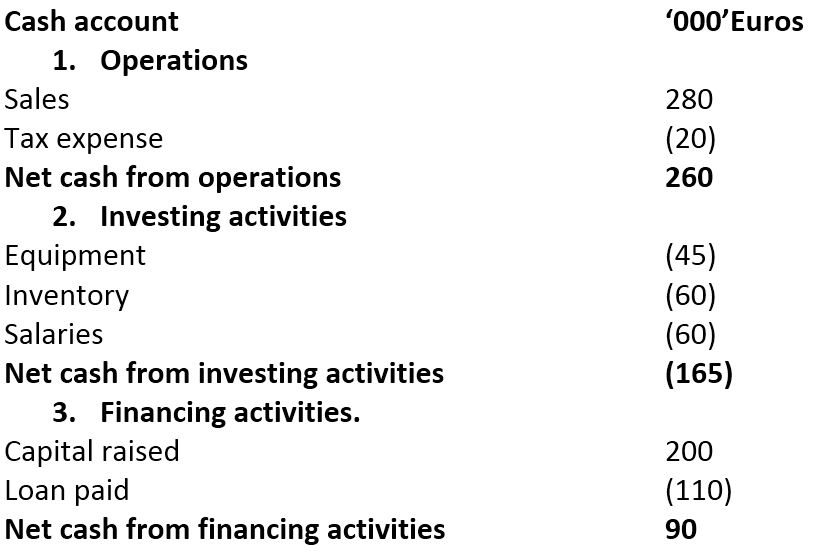
Cash flow for the year ended 31st December 2011= 185,000 Euros
Loly Bakery Balance sheet for the year ended 31st December 2011
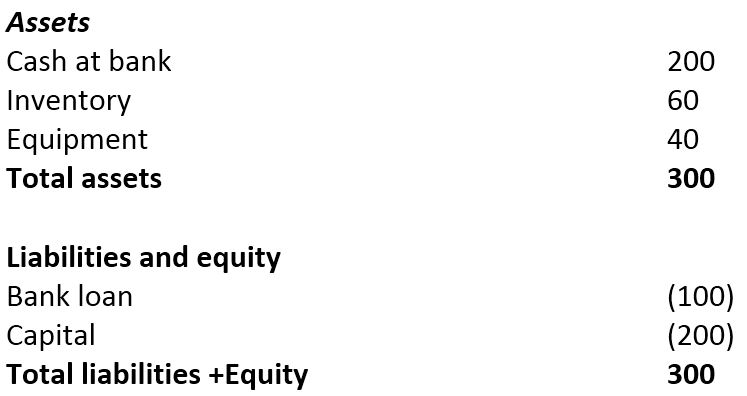
Loly Bakery Profit and loss account for the period ending 31st December 2011
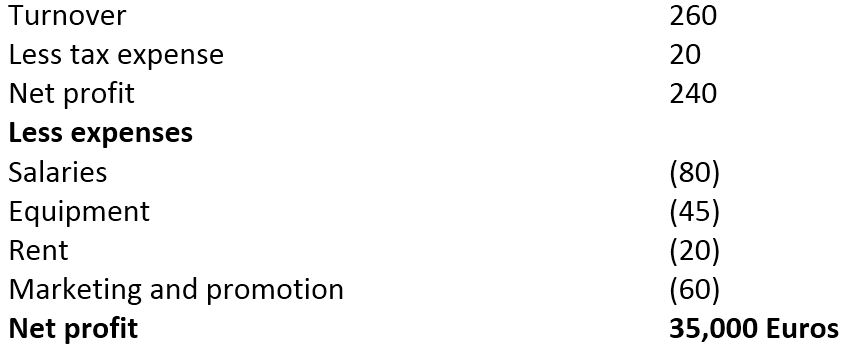
YEAR 2. Loly Bakery Cash account for the period ending 31st December 2012
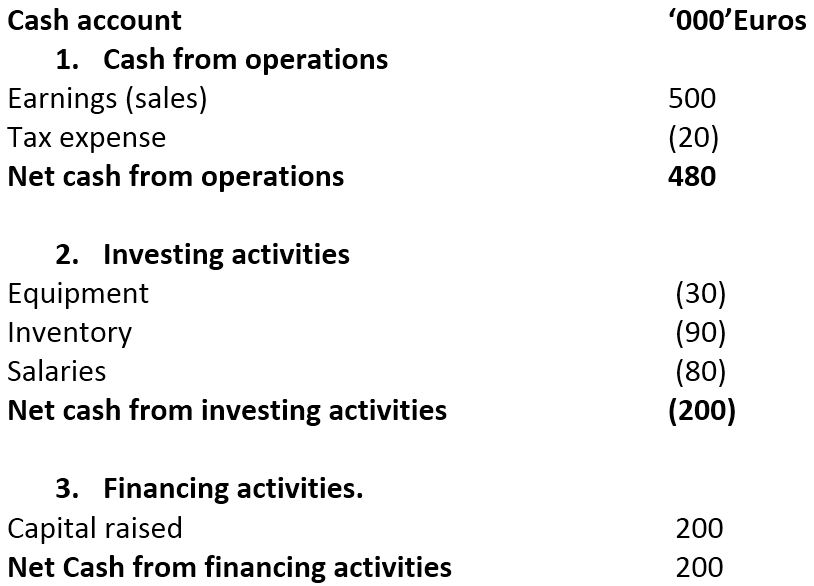
Cash flow for the year ended 31st Dec.2012 is (480-200+200) =480,000 Euros
Loly Bakery Balance sheet for the year ended 31st December 2012
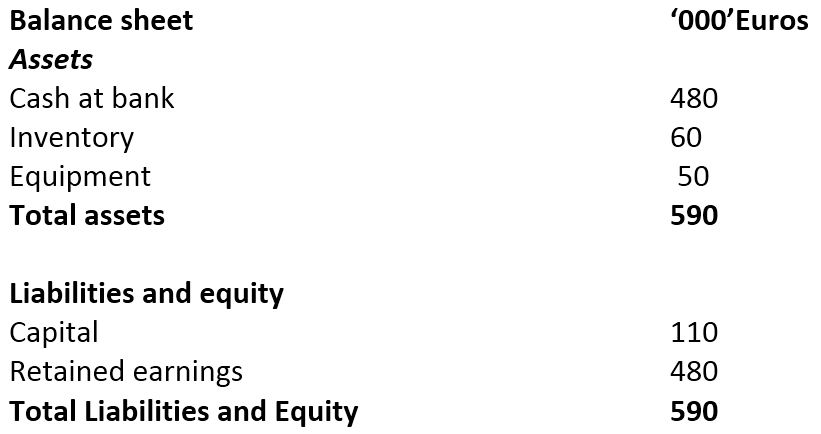
Loly Bakery Profit and loss account for the period ending 31st December 2011
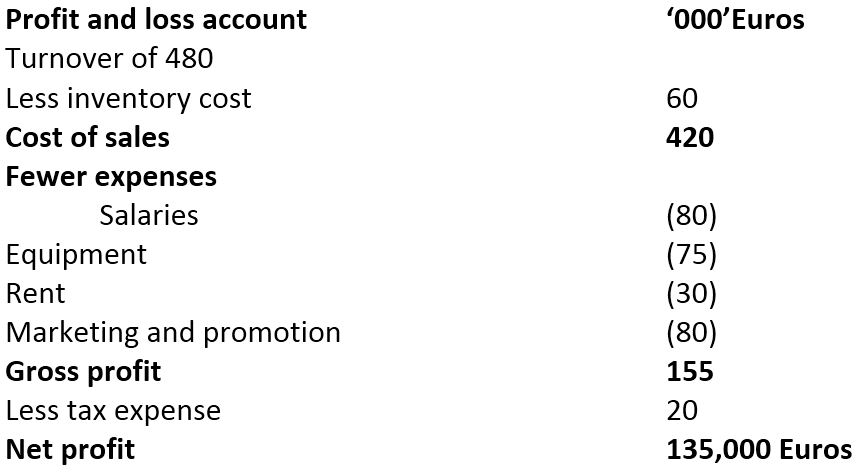
Summary
The business is profitable in its first year of operation. This is shown by the fact that revenue is more than the investment (Bolles and Hubbard, 2006, p. 16; Stutely, 2002, p.16; Brown, R., and Gutterman, 2003, p. 173). This is given by the fact that it is able to make profits besides being able to pay all its debts (Kraten, 2010, p. 128; Caspari and Caspari, 2004, p.314). More profits for the business are coming in the second year. In this year, the business is achieving a high-profit margin.
Analyzed against the first year, the business is able to increase its profits by 385%. This is a high rate of increase in profits and shows that the business is a good venture as well as investment (Abrams, 2003, p. 240; Botten, 2007, p.228; Scott, 2003, p.164; Ryan, 2004,p. 268). These figures mean that the investment cannot be lost (Hall, 2008, p.632; Barrow et al., 2008, p.167). The above conditions mean that the business is able to expand the production and still achieve profits (Capezio, 2010, p. 171; Hague, 2003, p. 67; Roney, 2004, p. 312).
References
Abrams, R. M. (2003) The successful business plan: secrets & strategies. Palo Alto, Calif: The Planning Shop.
Barrow, C., Barrow, P., and Brown, R. (2008) The business plan workbook: the definitive guide to researching, writing up and presenting a winning plan. London: Kogan Page.
Bolles, D., and Hubbard, D. G. (2006) The power of enterprise-wide project management. New York: American Management Association.
Botten, N. (2007) Management accounting: business strategy. Oxford: CIMA.
Brown, R., and Gutterman, A. S. (2003) A short course in international business plans: charting a strategy for success in global commerce. Novato, Calif: World Trade Press.
Capezio, P. (2010) Manager’s guide to business planning. New York: McGraw-Hill.
Caspari, J. A., and Caspari, P. (2004) Management Dynamics: Merging Constraints Accounting to Drive Improvement. New York: John Wiley & Sons Inc.
Hague, P. N. (2003) Market research: a guide to planning, methodology & evaluation. London [u.a.]: Kogan Page.
Hall, J. A. (2008) Accounting information systems. Mason, OH, South-Western: Cengage Learning.
Kraten, M. (2010) Business planning and entrepreneurship: an accounting approach. New York: Business Expert Press.
Roney, C. W. (2004) Strategic management methodology: generally accepted principles for practitioners. Westport, Conn: Praeger.
Ryan, B. (2004) Finance and accounting for business. London: Thomson Learning.
Scott, D. L. (2003) Wall Street words: an A to Z guide to investment terms for today’s investor. Boston: Houghton Mifflin.
Stutely, R. (2002) The definitive business plan. London: Financial Times, Prentice Hall.